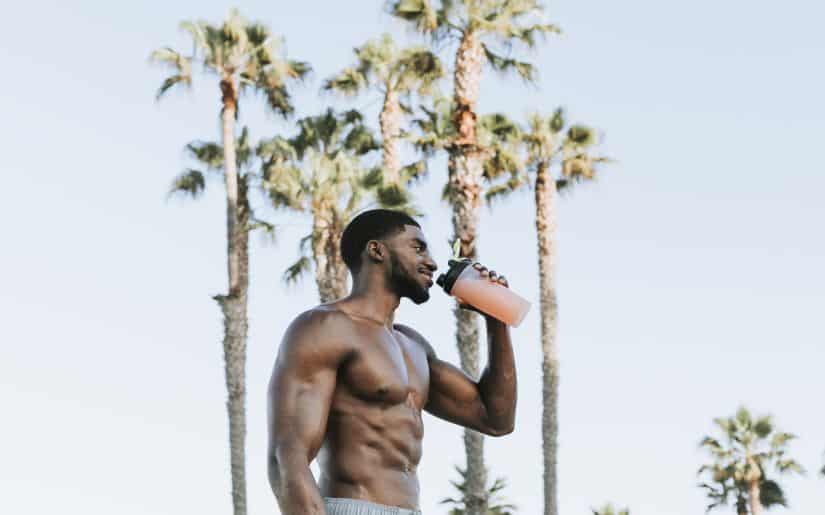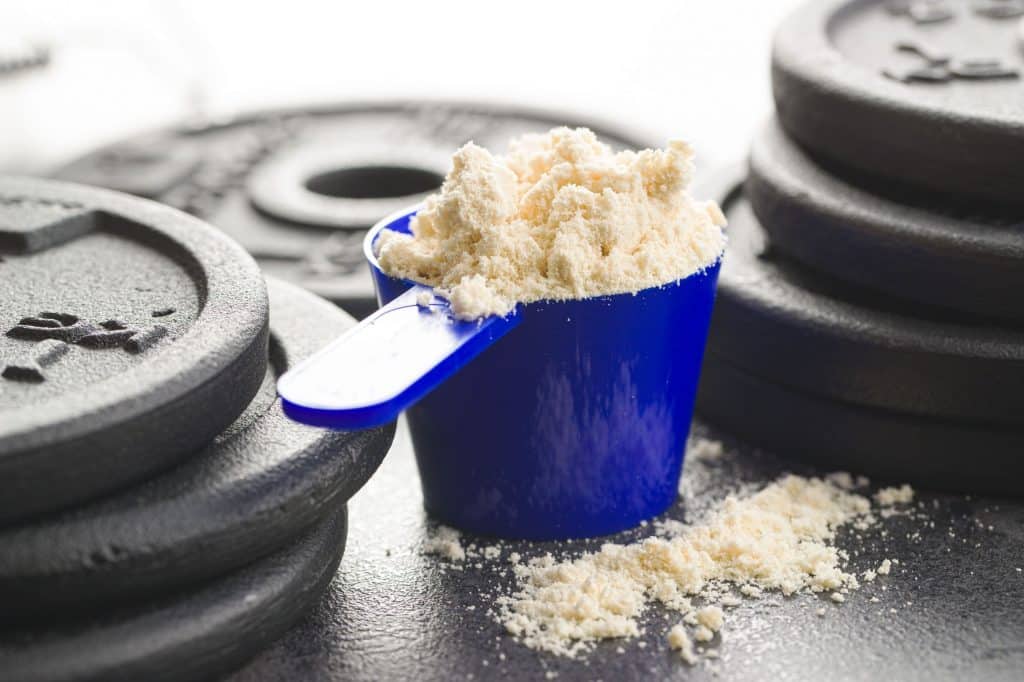If you’ve ever taken a walk down the supplement aisle at your local health food store, you’ve probably been a bit overwhelmed by the vast number of sports supplements available. Although pre- and post-workout supplements can be incredibly useful for helping you meet your aesthetic, performance, and nutritional goals, it’s hard to know which ones to try and which ones to skip.
To add to the confusion, a supplement that’s great for your workout buddy may not be a good choice for you. What does that mean? Well, it means you need to do your own research and choose your supplements based on your personal fitness goals.
Here’s a rundown of the most popular pre- and post-workout supplements, the evidence behind them, and our recommendations for getting the most out of each one.
Protein Powder
Protein powder is a common post-workout supplement that’s used for muscle growth and repair. You can find it just about anywhere, and there’s ample evidence that the body does indeed require protein to build, repair, and maintain muscle.
Protein powders are considered safe and effective, especially if you choose a high-quality supplement without a lot of fillers, sugar, or artificial ingredients. There are many different types of protein powders, but whey protein is probably the most popular.
Our Recommendations:
Whey contains more branched-chain amino acids than other types of protein, which makes it an excellent choice for muscle growth and recovery.
However, whey is made from dairy, so it’s not an option for those on a plant-based diet. For vegans and vegetarians, pea, rice, soy, and hemp protein powders are great choices.
Athletes should have 1.2 to 2.0 grams of protein per kilogram of body weight per day. If you’re not reaching this level of protein with the foods you eat, protein powders are a safe and effective way to meet your requirements.
For extreme athletes and bodybuilders, an extra serving of protein right after an intense workout can speed recovery time and build muscle. Making a sandwich with whole grain bread that’s been fortified with whey protein is an ideal post-workout meal. For most people, meeting your recommended protein intake throughout the entire day is what’s most important. That means you can incorporate a protein shake pre- or post-workout, or at any other time of day to reap its benefits.
Beta-Alanine
Beta-alanine is a pre-workout supplement that is used to enhance performance. Hydrogen ions build up in your muscles during strenuous exercise, slowing you down and causing muscle fatigue. Beta-alanine acts as a buffer for hydrogen ions, allowing you to work out longer.
Research shows that beta-alanine can indeed improve performance. If you’re into high-intensity exercise, it’s probably worth giving a try.
Our Recommendations:
The typical dosage of beta-alanine is somewhere between 2 and 6 grams per day, and you should follow the label instructions on the product you choose. Taking it with a meal will improve absorption.
Some people experience a tingling sensation if they take the entire dose beta-alanine at once. To alleviate this common side effect, divide your dose up throughout the day, or purchase a time-release product.
Creatine
Creatine is a pre-workout supplement that’s used primarily for muscle growth and enhanced performance. This peptide is stored in the muscles and provides them with energy.
Taking a creatine supplement increases the creatine stores within your muscles, resulting in enhanced performance during intense exercise, like strength training or running sprints.
Evidence shows that creatine is safe and effective. If you’re looking to improve your power and strength during physical activity, as well as build lean body mass, this a supplement worth trying.
Our Recommendations:
The typical dose of creatine is five grams daily, but you should follow the label recommendations on the product you choose. In the past, it was common to do a “loading phase” by taking a higher dose and then following with smaller doses afterward, but it’s probably not necessary.
Keep in mind that creatine is fantastic for gaining weight and muscle when taken consistently. If you’re looking to lose or maintain your current weight, approach this supplement with caution.
Pre-Workout Mixes
Pre-workout mixes are formulated to enhance performance by giving you more energy during your workouts. There are tons of them on the market and each one is formulated a little bit differently.
They generally contain a combination of caffeine, carbohydrates, amino acids, creatine, and sometimes beta-alanine along with other vitamins and minerals. There’s no doubt that the caffeine and carbs found in these mixes can give you an energy boost, while the creatine and other ingredients may enhance performance.
Our Recommendations:
Since each product will be different, you should follow the label instructions for your particular brand. Pre-workout mixes should not be taken on an empty stomach. If you are sensitive to caffeine, approach them with caution.
Tart Cherry Juice
Tart cherry juice is a popular pre- and post-workout supplement used to speed recovery after workouts. It contains an abundance of anthocyanins, which are an antioxidant that speeds muscle recovery and makes the body less likely to get sick after an extreme workout.
Science is just beginning to study the benefits of tart cherry juice for athletes, but it does show great promise as an effective recovery supplement. Since you can’t really go wrong with drinking natural cherry juice, it’s certainly worth giving a try to see if it speeds up your recovery.
Our Recommendations:
Tart cherries can be purchased in powdered form and mixed into water or a smoothie, or you can simply drink the juice. Try consuming 8 to 12 ounces of the juice two times a day for four days before an intense workout, and then for another two days afterward for faster recovery.
It should be noted that tart cherry juice is fairly high in carbs and natural sugar, so it may not be a great option for those who are trying to lose weight.
Fish Oil (Omega-3 Fatty Acid)
Omega-3 fatty acids provide numerous health benefits, but when it comes to your workouts, omega-3s are fantastic for reducing inflammation. That makes fish oil a great post-workout supplement for recovery and reducing muscle soreness.
Our Recommendations:
The standard dosage recommendation is usually two to four grams per day. You can also increase your intake of omega-3s by eating more fatty fish and nuts.
Vitamin C
Although most people only reach for vitamin C when they feel a cold coming on, but it’s also a fantastic pre- and post-workout supplement. It helps the body cope with stress, whether the stress comes from everyday life or a strenuous workout.
Vitamin C is a powerful antioxidant that’s necessary for coping with metabolic stress- and a strenuous workout is metabolic stress.
Our Recommendations:
Vitamin C can be taken every day, not just when you’re working out or feeling sick. Women need about 75 mg per day, while men should get at least 90 mg each day. If you take a personalized multi-vitamin every day, you probably don’t need an additional vitamin C supplement.
Mega dosing with Vitamin C is a popular practice, but you should never exceed 2,000 mg in the same day.
Branched-Chain Amino Acids (BCAAs)
Branched-chain amino acids are used by the body to assist in digestion, repair and grow body tissues, and more. They are commonly found in proteins like meat and eggs.
BCAAs are a great supplement to take before or after your workouts to help with muscle building and repairing damaged muscles after high-intensity exercise.
Our Recommendations:
Dosage of BCAAs will vary depending on your fitness goals and the product you choose. Most athletes can take up to 20 grams per day, but you should refer to your product label for specific dosages.
Final Thoughts
It’s always a good idea to consult with your medical professional before beginning a supplement regimen. Pre- and post-workout supplements are a great way to get that extra boost you need to meet your health and fitness goals. Not every supplement will work for every athlete, so be sure to do your own research based on your personal fitness goals.




